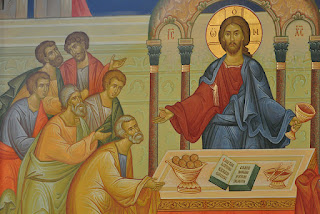Mensa Domini: 1662's use of 'Table' is not low church
As of old it was called Mensa Domini as well as Altare Domini, the one having reference to the participation, the other to the oblation of the eucharist ... it is in most of the fathers sometimes called a table.
Cosin's words are a reminder that the Prayer Book's consistent use of 'The Table', 'the Lord's Table', 'the holy Table' is not to contradict any use of 'Altar' but, rather, to emphasise that we "verily and indeed" feed on our Lord in the holy Eucharist. Mensa Domini is a declaration of a true feeding in "these holy mysteries".
There is, therefore, no need for Anglicans to be embarrassed about such usage in the Prayer Book. In fact, we should be celebrating it as a deeply patristic usage which points to the truth of our feeding upon the Lord's Body and Blood in the Sacrament.
Consider, for example, Chrysostom's use of 'Table' in his homilies on I Corinthians:
You have partaken of such a Table ...You have tasted the Blood of the Lord ... [God] counted you worthy of such a Table ...These words let us also listen to, all of us, as many as in this place approach with the poor to this holy Table ... you have enjoyed the Table of Christ, on that day on which you have been counted worthy to touch His flesh with your tongue ... raise your mind to that Table, to the Supper of the Lord ... These things are worthy of that Table. Have you heard holy hymns? Have you seen a spiritual marriage? Have you enjoyed a royal Table? Have you been filled with the Holy Ghost? Have you joined in the choir of the Seraphim? Have you become partaker of the powers above? Cast not away so great a joy, waste not the treasure.
What do you say, tell me? Is this Table which is the cause of so many blessings and teeming with life, become judgment? Not from its own nature, says he, but from the will of him that approaches. For as His presence, which conveyed to us those great and unutterable blessings, condemned the more them that received it not: so also the Mysteries become provisions of greater punishment to such as partake unworthily.
We have come to the same initiation, we enjoy the same Table. And why said he not, 'we are nourished by the same body and drink the same blood'? Because by saying "Spirit", he declared them both, as well the flesh as the blood. For through both are "we made to drink of the Spirit" ... one Spirit both formed us and gathered us all together into one body; for this is the meaning of, "we were baptized into one body": and vouchsafed us one table, and gave us all the same watering.
Likewise, Augustine:
The sacrament of this thing, namely, of the unity of the body and blood of Christ, is prepared on the Lord's table in some places daily, in some places at certain intervals of days, and from the Lord's table it is taken, by some to life, by some to destruction: but the thing itself, of which it is the sacrament, is for every man to life, for no man to destruction, whosoever shall have been a partaker thereof.
Tractate 26 on John's Gospel
I had promised those of you who have just been baptized a sermon to explain the sacrament of the Lord's table, which you can see right now, and which you shared in last night ... You see, the apostle says, We, being many, are one loaf, one body. That's how he explained the sacrament of the Lord's table; one loaf, one body, is what we all are, many though we be.
Sermon 227 on Easter Day
The Book of Common Prayer, therefore, reflects such patristic usage. It also reflects how the earlier Latin tradition maintained an Augustinian eucharistic discourse, including the use of 'Table'. Thus, for example Ratramnus in his De corpore et sanguine Domini (c.831AD):
And there is Berengar's key work De sacra coena (c.1050) - On the Holy Supper - and its consistent, frequent use of mensa dominica.




Comments
Post a Comment